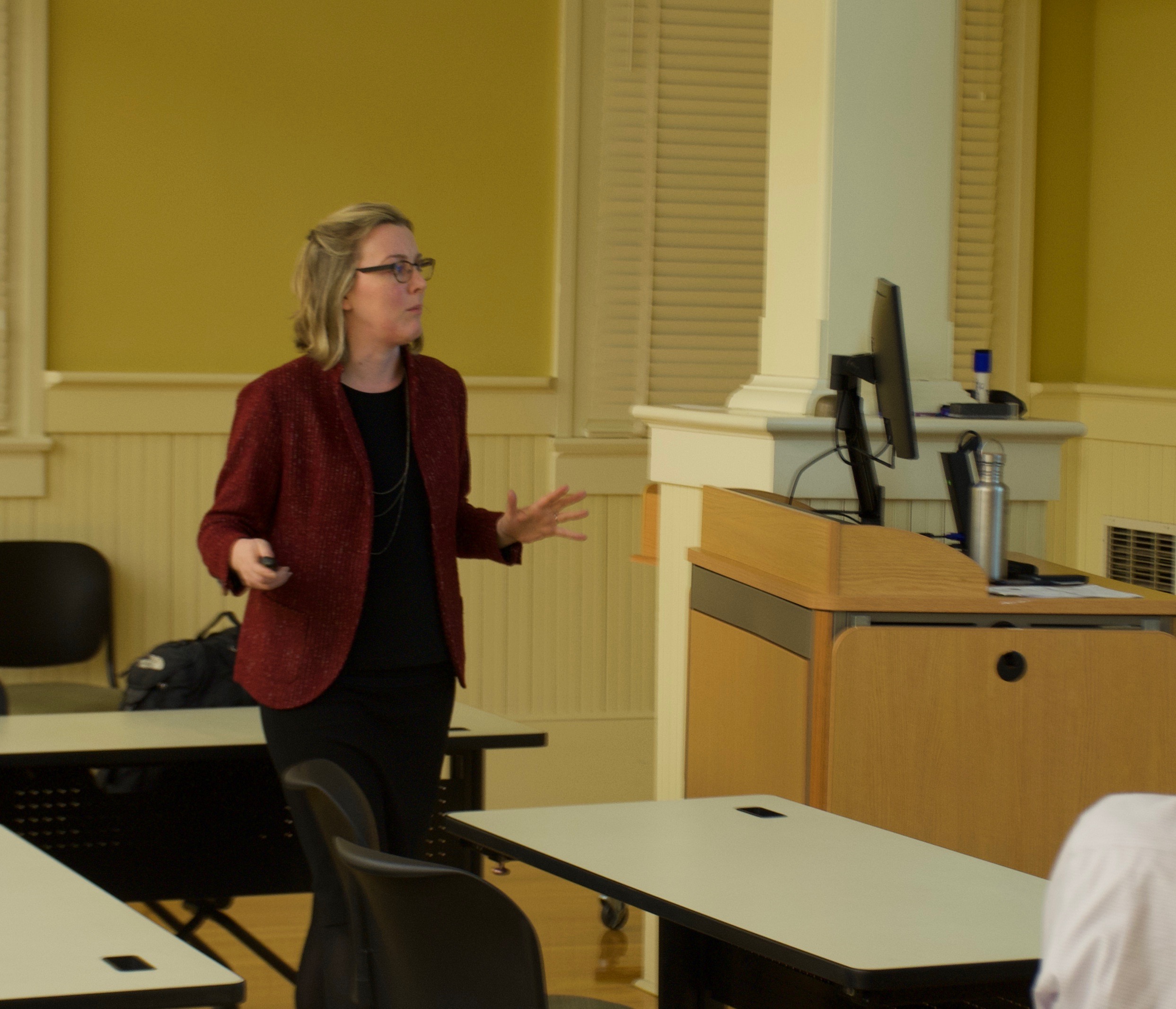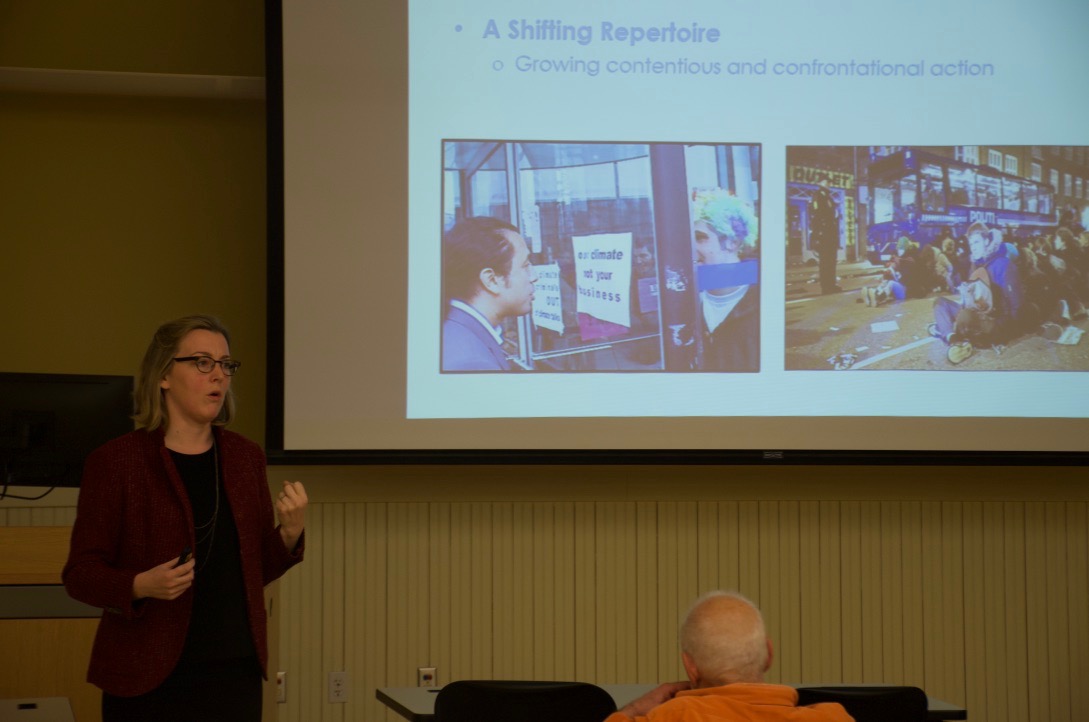According to University of Maryland professor Jennifer Hadden, the environmental movement’s shift from “climate science” to “climate justice” has increased its impact.
Hadden spoke at the Croft Institute for International Studies Monday night to about 30 people, who were mostly students and some Croft faculty. She explained how the 2007 United Nations Climate Change Conference in Bali, Indonesia, really changed the way climate activists related their findings to the public. They transitioned from using climate science to using “climate justice” to promote their cause, specifically in Europe.
“’Climate justice’ tends to frame climate change as an ethical and political issue, rather than purely an environmental or physical issue,” Hadden said.
With that shift, people began to see that climate change is not something that affects only nature, but humanity on a deep level. This, according to Hadden, particularly affects the poor and downtrodden (who are often exploited for resources and labor), as opposed to the wealthy, who typically cause a larger share of the problem.
“Those who are least responsible for climate change will suffer the worst consequences,” Hadden said.
In 1995, the number of non-governmental organizations (NGO) recognized by the United Nations Framework Convention on Climate Change (UNFCCC) was about 200. Just 22 years later, in 2017, the number of organizations rose to over 2000. Hadden attributed this growth to the increased number of youth participation in climate activism, as well as a backlash to the capitalist practices that are blamed for climate issues.
“People that cause the problem probably won’t experience the effects of the problem.” Hadden said. “It’s really their children, or their children’s children who will see the impacts.”
As climate change activism has adopted a less scientific and more political attitude, Hadden said that this gives governmental players more of an incentive to comply with protestors. Not doing so can harm a politician’s reputation.
“The idea is that we talk about something in terms of justice, you bring in more people, so you have a bigger constituency,” Hadden said. “And that helps with your political heft, but you also raise the stakes for not cooperating.”
Climate activism has also become more inclusive, and therefore much larger. According to Hadden, whereas rallies once featured about 50,000 people, the 2014 People’s Climate March in New York City boasted 300,000 participants. The difference is in the various politically-driven communities and organizations who have rallied around the “climate justice” message.
“When you bring in trade unions, groups that represent women and all sorts of different constituencies, you get an unprecedent amount of mobilization,” Hadden said.
Hadden argued that the “climate justice” framing of the climate change movement spurred figures like Greta Thunberg, whose “Fridays For Future” movement spread across the globe in 2018 and 2019. She alluded to the Thunberg-inspired protest at Ole Miss in September 2019, when numerous protestors with signs filled the Circle.
Jade Chalkley, a Sustainability Fellow of the UM Office of Sustainability, said that students should continue to be the ones leading climate change activism, since climate-related issues will never go away.
“It is always important for students to lead change, as students are the age demographic that will be seeing the largest effects of the climate crisis in their lifetimes,” Chalkley said. “Sustainability is not a destination.”
Ole Miss students are studying the effects of climate change in some very real ways, like those investigating it in their classwork.
Journalism professor Charlie Mitchell is teaching a course this semester in which students are reporting news stories regarding climate change that are specific to Mississippi. They are evaluating the issue from a variety of aspects such as health, agriculture, the seafood industry and weather events. Mitchell argued that while politicians tend to make climate change a political issue, it is not really political at all.
“Climate change is a global matter with local components, and the plan is to offer details about what Mississippians are experiencing and what’s being done or researched that is especially relevant to Mississippians,” Mitchell said.
Dr. William Schenck, the Associate Director of the Croft Institute, which hosted Hadden, said that teaching students the ways in which protest is constructive can be beneficial to them moving forward.
“People (at Ole Miss) are interested in learning how others around the world organize and what issues they are concerned about,” Schenck said. “Faculty and administration should support students who are advocating in a positive way, even if they don’t necessarily agree with all the aims.”
Bella St. Amant, a senior Croft (International Studies) student, argued that Ole Miss needs to foster more open dialogue on climate change, including protests.
“Specifically in climate change, that would be good,” St. Amant said. “At least having opportunities to talk about the issue or to talk about local, grassroots level efforts to take care of what we can while we can.”


